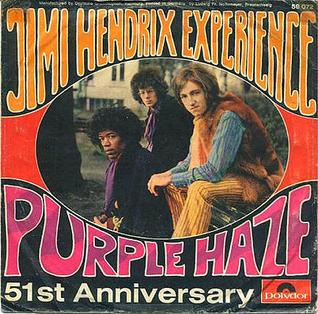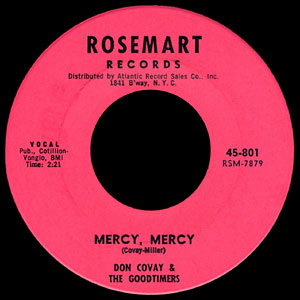Related Research Articles

Electric Ladyland is the third and final studio album by the Jimi Hendrix Experience and the final studio album released in Hendrix's lifetime before his death in 1970. Released by Reprise Records in North America on October 16, 1968, and by Track Records in the UK nine days later, the double album was the only record from the band produced by Hendrix. By mid-November, it had charted at number one in the US, where it spent two weeks at the top spot. Electric Ladyland was the Experience's most commercially successful release and their only number one album. It peaked at number six in the UK, where it spent 12 weeks on the chart.

"Purple Haze" is a song written by Jimi Hendrix and released as the second single by the Jimi Hendrix Experience on March 17, 1967. The song features his inventive guitar playing, which uses the signature Hendrix chord and a mix of blues and Eastern modalities, shaped by novel sound processing techniques. Because of ambiguities in the lyrics, listeners often interpret the song as referring to a psychedelic experience, although Hendrix described it as a love song.

Are You Experienced is the debut studio album by the Jimi Hendrix Experience. Released in 1967, the LP was an immediate critical and commercial success, and it is widely regarded as one of the greatest debuts in the history of rock music. The album features Jimi Hendrix's innovative approach to songwriting and electric guitar playing which soon established a new direction in psychedelic and hard rock music.

"Johnny B. Goode" is a 1958 rock-and-roll song written and first recorded by Chuck Berry. Released as a single, it peaked at number two on Billboard magazine's Hot R&B Sides chart and number eight on its Hot 100 chart.

"Sunshine of Your Love" is a 1967 song by the British rock band Cream. With elements of hard rock, psychedelia, and pop, it is one of Cream's best known and most popular songs. Cream bassist and vocalist Jack Bruce based it on a distinctive bass riff he developed after attending a Jimi Hendrix concert. Guitarist Eric Clapton and lyricist Pete Brown later contributed to the song and drummer Ginger Baker plays a distinctive tom-tom drum rhythm.

Band of Gypsys is a live album by Jimi Hendrix and the first without his original group, the Jimi Hendrix Experience. It was recorded on January 1, 1970, at the Fillmore East in New York City with Billy Cox on bass and Buddy Miles on drums, frequently referred to as the Band of Gypsys. The album mixes funk and rhythm and blues elements with hard rock and jamming, an approach which later became the basis of funk rock. It contains previously unreleased songs and was the last full-length Hendrix album released before his death.

"Foxy Lady" is a song by the Jimi Hendrix Experience. It first appeared on their 1967 debut album Are You Experienced and was later issued as their third single in the U.S. with the alternate spelling. It is one of Hendrix's best-known songs and was frequently performed in concerts throughout his career. Rolling Stone magazine placed the song at number 153 on its list of the "500 Greatest Songs of All Time".

"Voodoo Child " is a song recorded by the Jimi Hendrix Experience in 1968 that appears as the final track on the Electric Ladyland album released that year. It contains improvised guitar and a vocal from Jimi Hendrix, backed by Noel Redding on bass and Mitch Mitchell on drums. The song is one of Hendrix's best known; it was a feature of his concert performances throughout his career, and several live renditions were recorded and released on later albums.

"Fire" is a song written by Jimi Hendrix and recorded by the Jimi Hendrix Experience in early 1967. It has been described as "an exercise in soul, psychedelic rock, and polyrhythmic jazz-inspired drumming" by AllMusic critic Matthew Greenwald. The song was remixed in stereo for the American release of the album. In 1969, it was released as a stereo single in the UK with the title "Let Me Light Your Fire".
"Have You Ever Been " is a song by English-American rock band the Jimi Hendrix Experience, featured on their 1968 third album Electric Ladyland. Written and produced by frontman Jimi Hendrix, the song acts as the title track of the album, as well as essentially the opening track following the short instrumental intro "...And the Gods Made Love".
"Stone Free" is a song written by Jimi Hendrix and the second song recorded by the Jimi Hendrix Experience. It has been described as a "counterculture anthem, with its lyrics praising the footloose and fancy-free life", which reflected Hendrix's restless lifestyle. Instrumentally, the song has a strong rhythmic drive provided by drummer Mitch Mitchell with harmonic support by bassist Noel Redding. "Stone Free" was issued on December 16, 1966, as the B-side of the Experience's first UK single "Hey Joe" and later included on the Smash Hits compilation album.

"Burning of the Midnight Lamp" is a song recorded by English-American rock trio the Jimi Hendrix Experience. Written by frontman Jimi Hendrix and produced by band manager Chas Chandler, it features R&B group Sweet Inspirations on backing vocals.

"Mercy, Mercy" is a soul song first recorded by American singer/songwriter Don Covay in 1964. It established Covay's recording career and influenced later vocal and guitar styles. The songwriting is usually credited to Covay and Ron Alonzo Miller, although other co-writers' names have also appeared on various releases.

"Up from the Skies" is a song written by Jimi Hendrix. Recorded by the Jimi Hendrix Experience in 1967, it was released on their second album Axis: Bold as Love. The lyrics reflect Hendrix's interest in science fiction and relate an extraterrestrial visitor's curiosity about life on Earth. Musically, it incorporates elements of jazz, particularly in drummer Mitch Mitchell's use of brushes.
"Highway Chile" is a song by the Jimi Hendrix Experience, issued as the B-side to their 1967 third British single "The Wind Cries Mary". The song was written by vocalist and guitarist Jimi Hendrix and titled to reflect his pronunciation of "child" without the "d".

Rainbow Bridge is a compilation album by American rock musician Jimi Hendrix. It was the second posthumous album release by his official record company and is mostly composed of recordings Hendrix made in 1969 and 1970 after the breakup of the Jimi Hendrix Experience. Despite the cover photo and subtitle Original Motion Picture Sound Track, it does not contain any songs recorded during his concert appearance for the 1971 film Rainbow Bridge.

"Crosstown Traffic" is a song written by Jimi Hendrix and recorded by the Jimi Hendrix Experience for their third album, Electric Ladyland (1968). It was released as a single after "All Along the Watchtower", reaching number 52 on the US Billboard Hot 100 and number 37 on the UK Singles Chart.
"Ezy Ryder" is a song written and recorded by American musician Jimi Hendrix. It is one of the few studio recordings to include both Buddy Miles on drums and Billy Cox on bass, with whom Hendrix recorded the live Band of Gypsys album (1970).
"Wait Until Tomorrow" is a song by the Jimi Hendrix Experience from their 1967 second album Axis: Bold as Love. Written by Jimi Hendrix, the song details the scenario of a male protagonist addressing his female love with whom he plans to leave home, only to be shot dead by her father. Despite not being released as a single, "Wait Until Tomorrow" has been recognized as one of the strongest songs on the album.

"Bleeding Heart" is a song written and recorded by American blues musician Elmore James in 1961. Considered "among the greatest of James' songs", "Bleeding Heart" was later popularized by Jimi Hendrix, who recorded several versions of the song.
References
- ↑ From the original US Reprise Records single
- ↑ "Jimi Hendrix: Chart History – Hot 100". Billboard . Retrieved March 20, 2019.
- ↑ "Jimi Hendrix – Singles". Official Charts . Retrieved March 20, 2019.
- 1 2 Greenwald, Matthew. "The Jimi Hendrix Experience: "Gypsy Eyes" – Review". AllMusic . Retrieved March 20, 2019.
- ↑ Middleton, Richard (1990/2002). Studying Popular Music, p.137. Philadelphia: Open University Press. ISBN 0-335-15275-9.